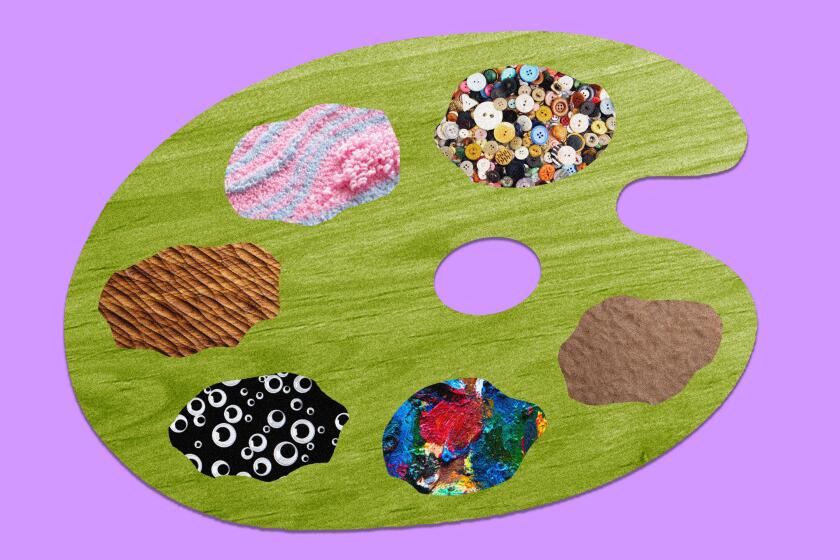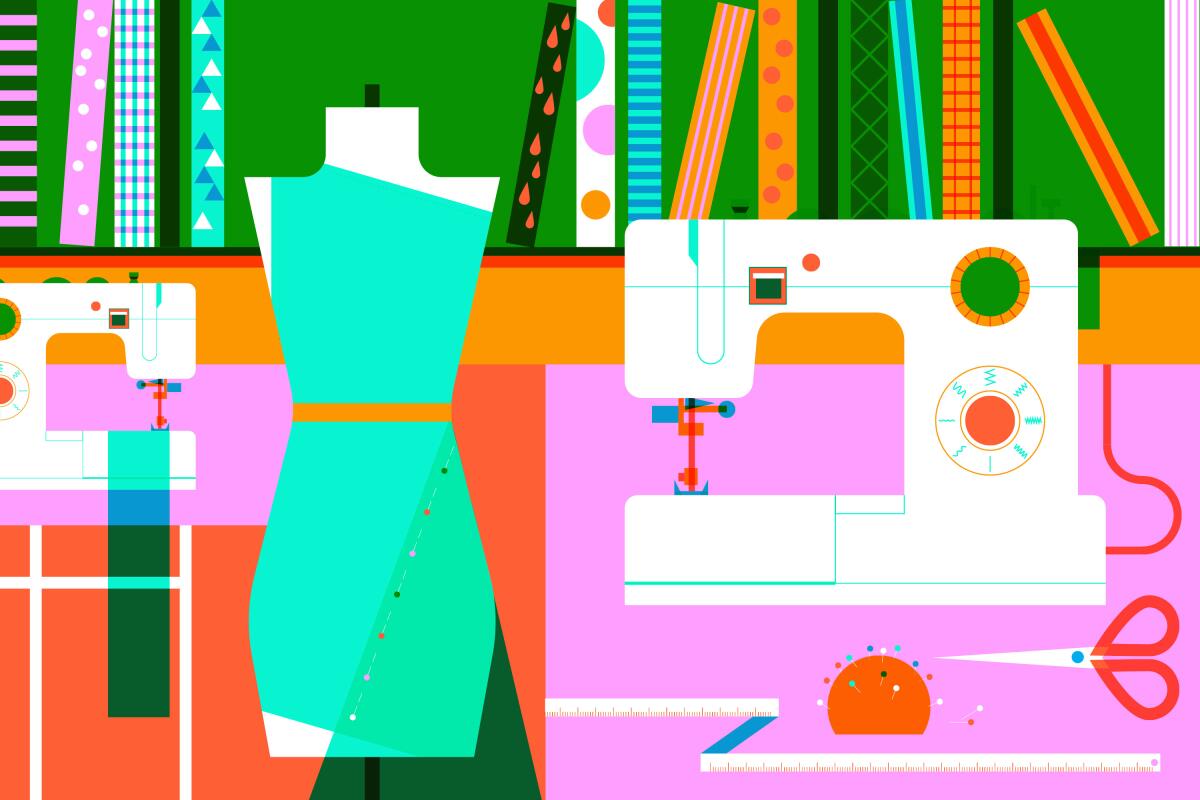
Custom is the new luxury: 8 great places to learn to sew in L.A.
Once upon a time, saying something looked “homemade” was perceived as an insult.
But now that fast-fashion brands have made cheap clothes accessible on a global scale, everyone is dressing the same. Sartorial individualism has collapsed in the face of trendiness.
In order to stand out today among the Zara- and Shein-clad masses, intrepid fashion savants are experimenting with more handmade, custom looks as vehicles of self-expression. Now that everyone has access to the same garments, exclusive, 1-of-1 pieces are the true markers of luxury.
As overconsumption and overproduction clog the market with cheap, synthetic fabrics that last only a few wears, there is a greater desire among consumers to prioritize quality over quantity, even if that means not capitalizing on every microtrend. With the planet in peril and the fashion industry driving waste and pollution, savvy consumers are increasingly looking to secondhand clothing, modifying existing pieces to reflect modern tastes. Today’s sustainability-minded consumers also are turning to slow-fashion techniques like mending and altering to make sure their clothes last beyond any trend cycle.
Planning your weekend?
Stay up to date on the best things to do, see and eat in L.A.
Some of the most exciting players in this new fashion landscape are Gen-Z influencers: The latest winner of Netflix’s “Next in Fashion” competition series, Nigel Xavier, took home the $200,000 prize for his signature brand of patchwork and textile manipulation and deconstruction. Instagram fashion influencer Ysabel Hilado, who amassed more than 100,000 followers through her creative upcycling videos, just published a book of accessible project ideas: “The DIY Guide to Sewing, Mending and Sustainably Reinventing Your Wardrobe.” And TikTok personality Tanner Bowen has gone viral for his fashion newsletter, Garbie, which offers tutorials and essays on everything from sourcing cheap fabric to sewing along curves.
For those too young to remember when home ec was taught in schools, there are a wealth of different options for beginning one’s sewing journey. From websites like Craftsy to YouTube makers such as @withwendy and @BlueprintDIY, there are several online options for learning to sew. Prefer an in-person lesson? Here are eight great sewing studios and private sewing instructors around L.A., from Leimert Park to Sherman Oaks. To compare pricing, $ signifies less than $100 per two-hour class and $$ means $100 to $150 per two-hour class.
Whether you want to try candle making, Jaipur block printing, glass blowing, neon bending or woodworking, L.A. has a space for that.
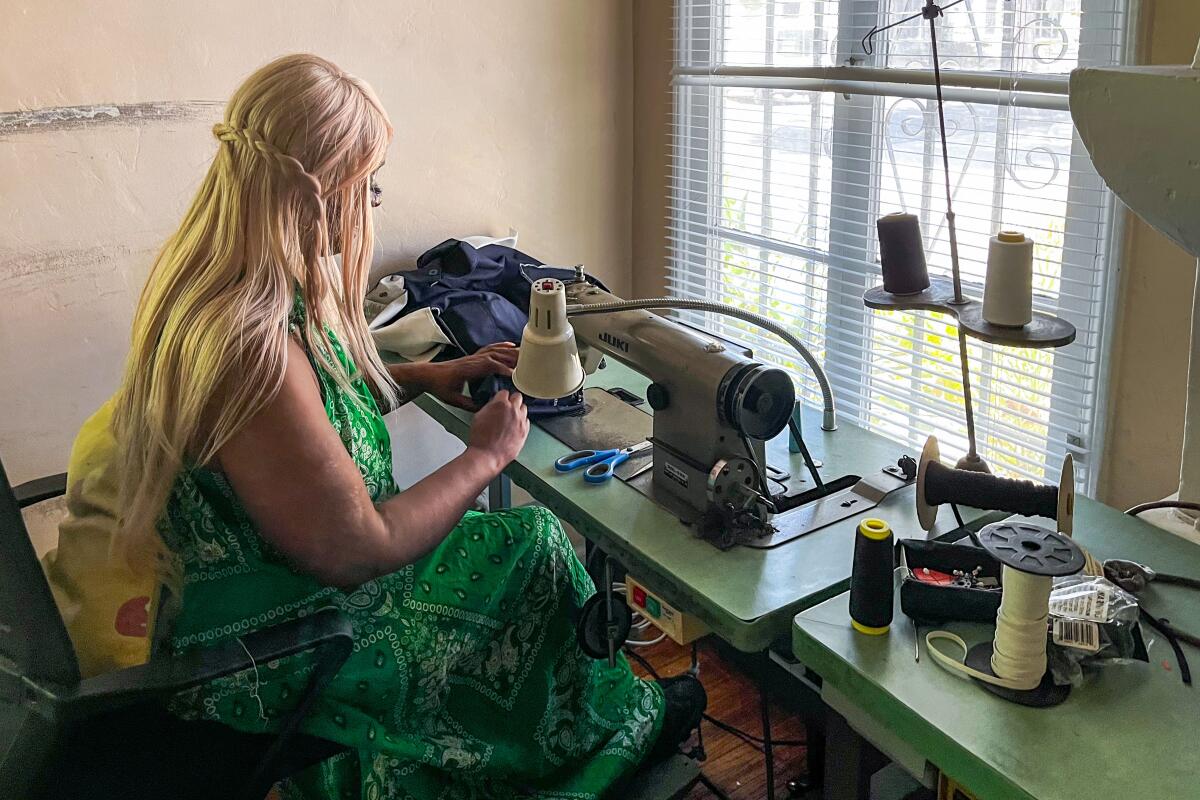
Lilian Raven Clothing
Located in the front room of a private residence in Leimert Park, the studio has been hosting sewing classes since 2013 but suspended group classes after the pandemic. “Our goal is to teach you what you want to learn, which is why we are more focused on 1-on-1 classes,” she explained. “There are so many nuances to this art that people are able to choose specifically what they need. Learning to sew builds self-esteem and confidence. It helped me a lot when I was growing up.”
Raven, a native of Liverpool, England, says she learned to sew watching over her mother’s shoulder. “The thing that I loved about sewing was it helped me to lose myself,” she said. “I’m a burn survivor, I was burned when I was 4 years old, and it was a very traumatic experience. But the fact that I was able to create and lose myself in sewing was just a great confidence boost. It was literally magical.”
Raven’s studio is filled with machines of different makes and models, including several industrial machines and sergers, which sit atop long tables bordering three walls. I took a private two-hour lesson with her with the goal of constructing a cutout dress from a store-bought pattern. Raven helped me cut out the pattern pieces and put them together, chatting the whole time in her soft English lilt. Our session ended up stretching past the two-hour mark and Raven — whose teaching style is informal and unpretentious — wound up doing much of the work for me so that I could leave with as finished a project as possible.
In addition to private lessons, Raven offers custom and bulk sewing services, catering to anyone from newbies and hobbyists to startups and brands. She has styled for Jay-Z and created custom pieces for Khloe Kardashian, Big Boi, Drakeo the Ruler and others.
“We’ve had a few actresses [come by] for sewing classes, but mainly we work with celebrities on the custom or bulk sewing side,” she said. “I’ve had a lot of people come through here and start their own brands and find their own niche, and they still call me for advice.”
“[Sewing is] a mood enhancer and it makes me happy. I know if it can do that for me, it can do that for other people.”
Address: This studio’s address is given only by request. Contact the studio for more information.
Parking: Street parking
Price: $45 for a wig-making class, where you’ll sew tracks of hair onto a mesh cap; $70 for a two-hour private sewing lesson; $120 for a private lesson for two
What to bring: Your home sewing machine (if you don’t have one, Raven provides loaners) and a sewing pattern/project you would like instruction on
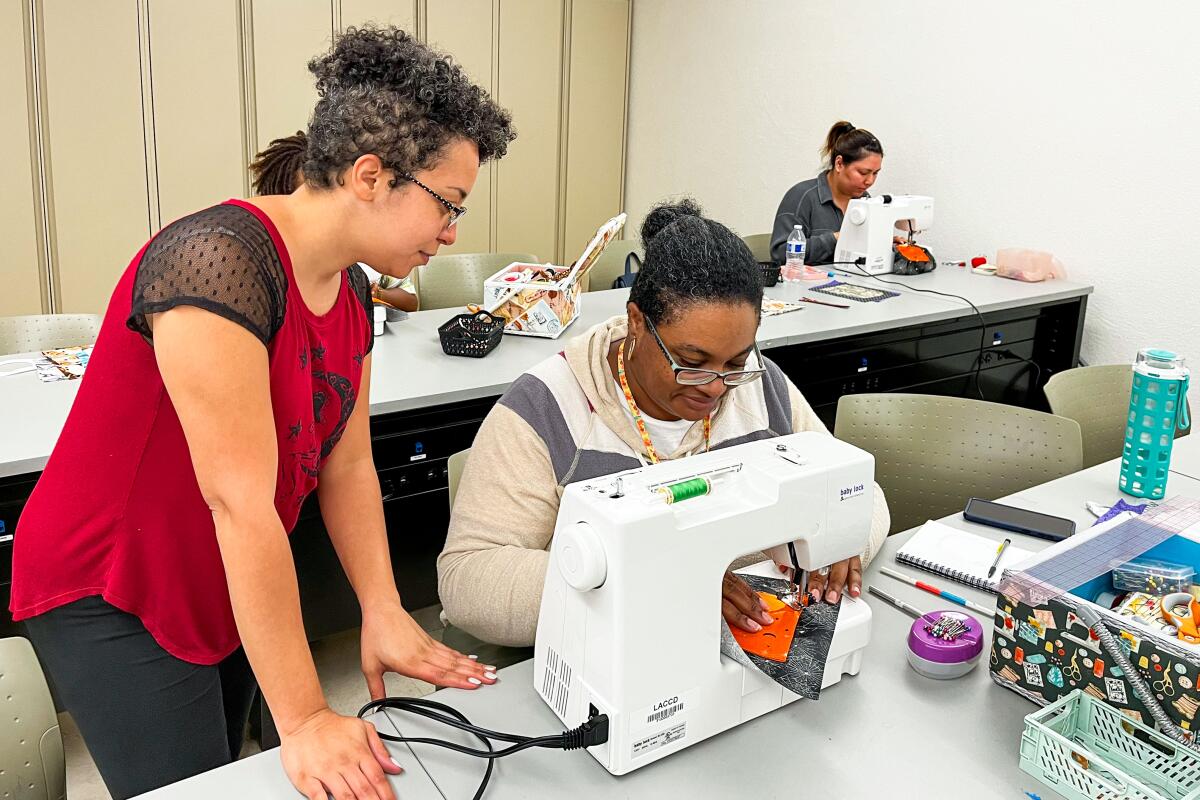
Los Angeles City College
“Through research, I saw how expensive sewing classes can be,” said LACC community services manager Jason Lesner. “We’re really proud to offer quality sewing lessons at reasonable prices.”
The level one course focuses on sewing machine operation and basic foundational techniques, including how to measure, mark, pin and cut fabric, before students are guided through the construction of an envelope-closure pillowcase as a final project.
Level 2: The Pattern offers instruction on deciphering a basic sewing pattern, taking one’s own measurements, making simple pattern adjustments and eventually completing a pair of elastic-waist pants.
I took classes in the third level of the series, which focuses on techniques for garment construction including several styles of zippers, pockets and necklines. Walker led us through the proper installation of four kinds of pockets (self-lined, self-facing, inseam and slash pockets), four types of zippers (invisible, lapped, railroad and exposed) and bias-tape-finished necklines.
Currently the college’s sole sewing instructor, Walker has been sewing for 30 years and teaching for 15. She is a very precise instructor, carefully explaining the logic behind and demonstrating every technique before allowing students to try for themselves. (She plans to do the same on her nascent YouTube channel, Stitchuational Awareness). For each technique she had a premade mock-up so students could see the final product along with the sample she made in real time.
“I always endeavor to ensure that students not only get through a project but understand the hows, whys and the way everything works as well,” said Walker. “That way students are empowered to think critically, make their own choices and can troubleshoot any issues, enabling them to achieve good results independently of a sewing instructor.”
Sewing students at LACC range from high school age to retirees and everywhere in between. “The students are a mix of all sorts,” said Walker. “Some have a vision for their own unique wardrobe and some are just dipping their toes into something new and fun. Some people already even work in some aspect of the fashion industry and want to learn sewing to widen their skill set.”
This summer, the college began offering a 2½-hour class for $39 that teaches students how to operate their own personal sewing machine or serger. The college would like to explore sewing classes geared toward Spanish speakers and teens in the future, Lesner said.
Parking: Metered street and covered garage parking
Price: $39 for a 2½-hour class, $119 for a five-week course
What to bring: LACC provides a list of standard class materials for each course including fabric shears, pins and a pincushion, tailor’s chalk and a seam ripper.
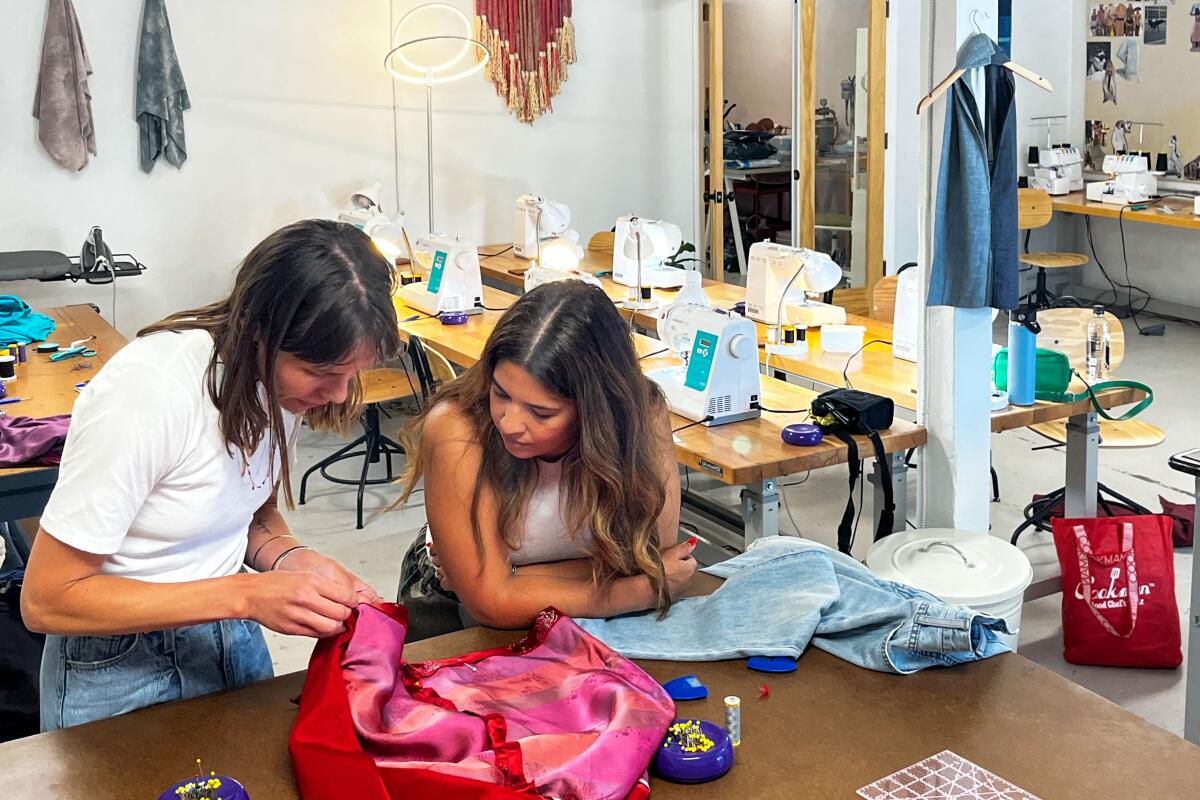
Moving Thread
The studio is part of These Hands Makers Collective, a communal artist space on Washington Boulevard whose sparse, industrial-style aesthetic calls to mind an Urban Outfitters or Anthropologie outpost.
Moving Thread offers a wide variety of workshops spanning garment construction (past projects include pants, a bikini, a button-down shirt, a smocked dress, a kimono, a boxy T-shirt and a tiered maxi skirt), Sashiko embroidery, pattern making, quilting, alterations and hand sewing, mending and embellishment. Also on offer are kids sewing workshops, kids and teen fashion series and parent and child series as well as private lessons and Sip ‘N Sew events.
Ziranek remembers basketball star Dwyane Wade brought his mom to the studio for a surprise birthday sewing class. “Dwyane was a pretty good sewer too,” she said. “But he was so tall he could barely sit at the sewing table!”
I attended an alterations workshop where, in three hours, Ziranek helped me take in a smocked dress, replace the straps on a cowl-neck gown and get started taking in the waist of a lined skirt.
Ziranek — whose melodic South African accent contributes to her overall air of unflappable serenity — was casually fashionable in deconstructed Agolde jeans, a crisp white T-shirt and Birkenstocks. At the beginning of class she had students gather around one of the studio’s long worktables to share the intentions we had for the garments we brought in and to discuss alteration possibilities as a group.
The combination of Ziranek’s soft manner, the studio’s bright and clean aesthetic and the act of working on separate projects alongside other busy people lulled me into a deep sense of tranquility that felt akin to a therapy session. Ziranek put on an easy-listening playlist and traversed the room offering help as needed: pinning garments into place for students and threading the Singer machines.
“I spent many years designing clothes and working for fashion brands, but after becoming a mother, I was seeking something more meaningful in my professional career,” she said. “I never imagined myself as an educator, but I find teaching incredibly fulfilling. I believe I’ve created a space that calms the soul, a space to breathe and work with your hands, a space to come together and create and get off our phones. A space to be present.
“Learning to sew is a way for us to have a stronger relationship with the clothes we buy and wear, a way for us to have respect for the people who make our clothes, a way to give our clothes a longer life and for us to be more mindful of where our clothes end up after the life we share with them. Because loved clothes last and our planet needs more people on its side.”
Parking: Metered street parking
Price: $150 for a three-hour intro workshop, $160 for an alterations workshop, $500 for a four-week beginner series
What to bring: Nothing. Moving Thread provides all machinery, tools and materials unless otherwise specified
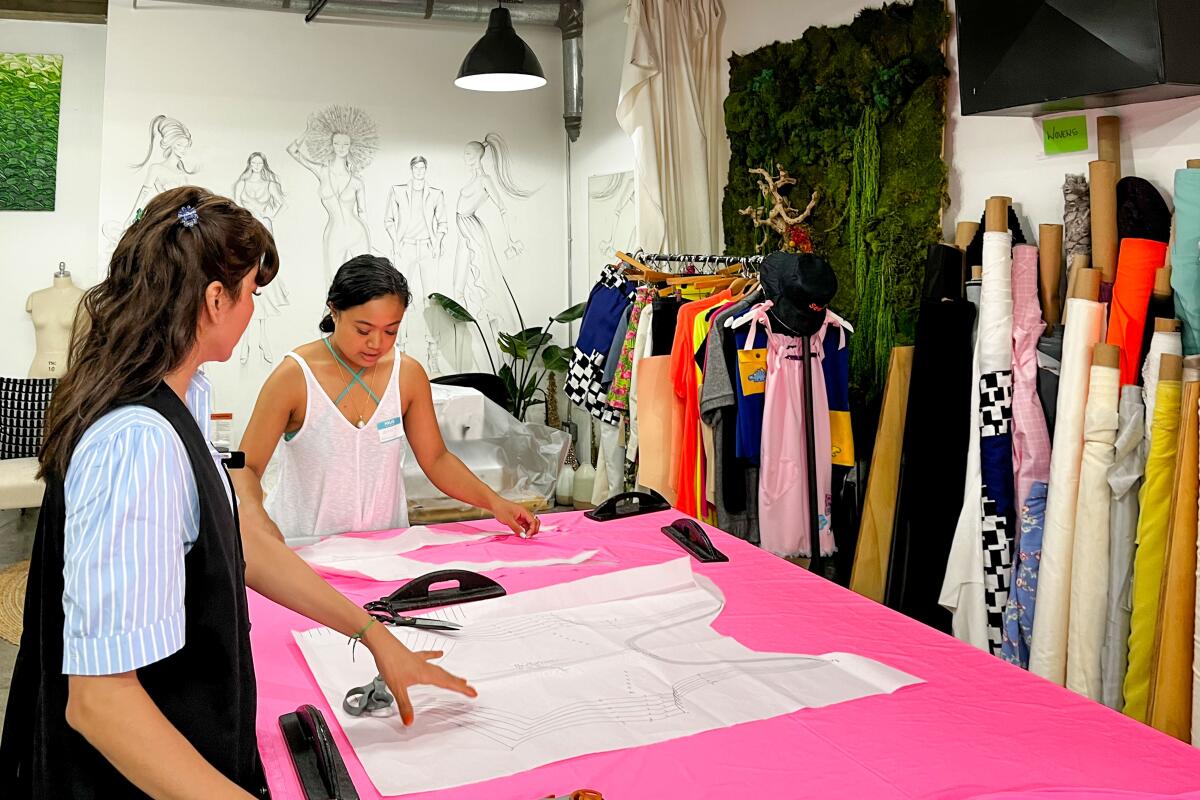
Sew FYI
In fact, “Next in Fashion” Season 2 contestant and fashion designer Usama Ishtay is an alumnus of the studio, where courses are tailored to aspiring fashion designers and industry professionals.
Owned by Yena Sam and Fion Wang, Sew FYI has been in business for nine years. In addition to sewing classes, the studio offers lessons in fashion sketching, draping and pattern making as well as services for small fashion lines such as sample creation and the production of limited runs. Virtual classes also are available.
“We firmly believe in nurturing creativity and empowering individuals of all ages to pursue their dreams and passions,” said Sam. “Among our students we welcome those who wish to apply for fashion schools, designers running their own fashion lines and industry professionals seeking to expand their knowledge and gain insights on starting their own businesses.”
The co-working sewing and design space is available 24/7 to members, with subscriptions offered for daily, weekly, monthly and annual membership tiers. Additional memberships are available for 12-hour blocks from $65 for a day pass. “We’re like a gym for designers,” reads a description on the studio’s website. “We provide the equipment, you bring the creativity.”
For those just looking to take a one-off lesson, upcoming workshops include introductions to home sewing, serger and industrial machines as well as sewing series in which students are led through the construction of projects such as a pillowcase, zippered bag, pants, skirt, shirt, leggings and hoodie. Two-hour personal workshops also are available for $175.
I took a five-hour swimsuit workshop with instructor Jessica Vazquez, who led me and two other students through the construction of a reversible bathing suit using a serger. Students could choose from multiple one-piece and bikini styles, with the cost of the pattern included in the class fee (fabric is not included but is available in-studio for $25 per project).
The studio offers a limited assortment of free refreshments from a well-stocked kitchenette and music plays softly from the television by the fridge. When we finished our projects, Vazquez mounted a beachy backdrop on the large whiteboard at the front of the room and staged professional photos of our creations using one of the studio’s 11 dress forms.
Those not seeking a career in fashion needn’t be intimidated by the studio’s pedigree: Unlike some fashion competition shows, the vibe among my fellow students was congenial and friendly. Whether you’re there to attend a 10-hour personal workshop ($810) or a five-hour dog clothes workshop ($250), it’s fun just to pretend you’re heading up your own couture atelier.
Parking: Free street parking and limited parking outside the building
Price: From $90 for a two-hour sewing workshop to $935 for an all-inclusive multiclass pass. A 2½-hour machine intro workshop costs $105 for a home machine and $175 for an industrial machine.
What to bring: The studio provides most of the tools needed to complete a workshop but bring your own fabric unless you want to pay the studio’s $25 materials fee.
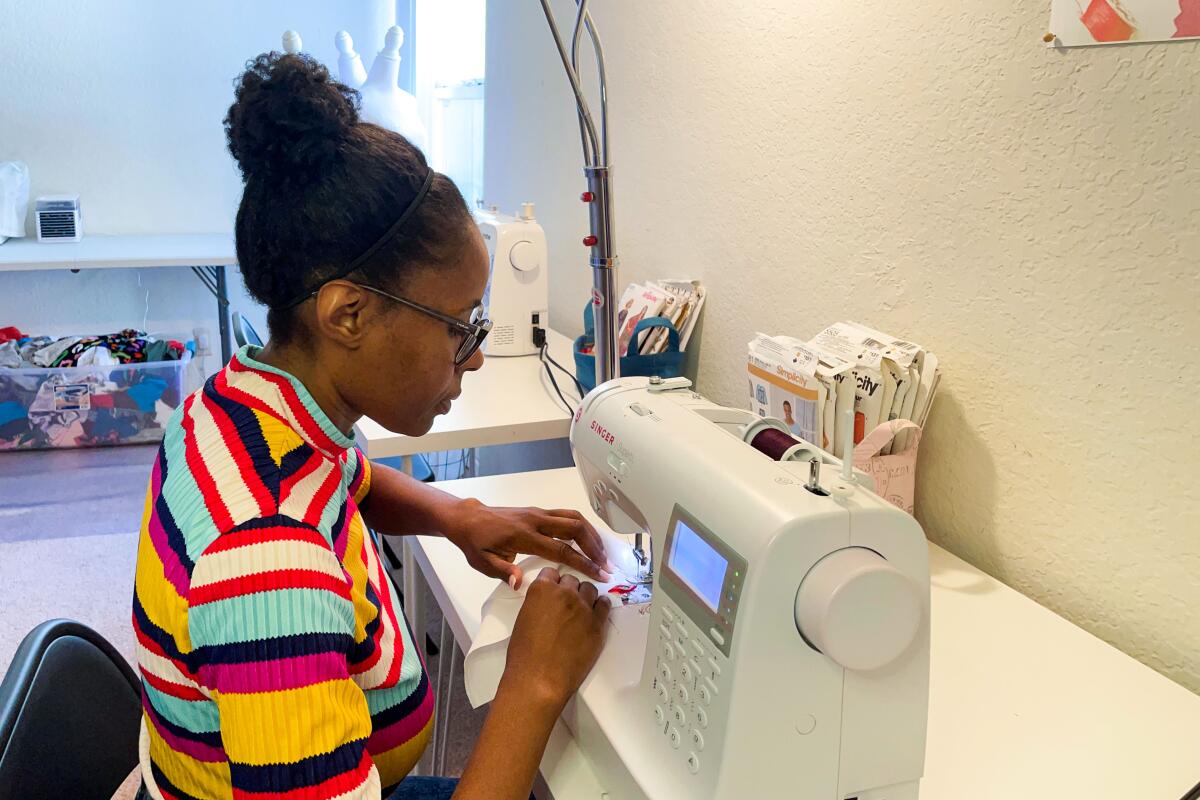
Sew Into It
A sewing and textiles educator who shares sewing tutorials on her YouTube channel @sewintoitlessons, Washington offers private lessons in monthly packages of three or four two-hour classes as well as single sessions for $90.
Washington’s meticulous and precise teaching style betrays her previous experience as a middle-school teacher: Before our appointment, she scheduled a phone call to discuss goals for the lesson followed by a sewing room tour to get acquainted with the sewing space and make a plan for the projects I would bring. By the time I arrived at the studio a few days later, she’d already put thought into how best to tackle the tapered pant legs, lined neckline and lined skirt alteration projects I’d brought and had put together mock-ups demonstrating techniques for each.
“Sewing and teaching have always been a part of my life, but I spent years choosing one or the other,” Washington said. “Sew Into It came about when I decided to stop choosing and do both.”
Washington asks patrons to bring their own machines where possible and to remove shoes at the door. Basic sewing supplies and fabrics are included with most of her lessons. At the end of our sessions, she gave me a little bag filled with sewing notions including pins, a seam ripper and a mini gridded ruler that I now use religiously.
During the summer months, Washington offers two styles of summer camps for kids: fashion camp, which focuses on the apparel industry and fashion design process; and creative camp, which encourages unconventional approaches to fashion like sun-activated paint, hand embroidery and ice dyeing. These camps are held at local South Bay community centers.
For the holiday season, Washington offers seasonal workshops including stuffed pumpkin making, no-sew T-shirt blanket and ugly Christmas sweater decorating classes. Private group lessons of two to four students are available as well as dedicated lessons for homeschool students.
Address: This studio’s address is given only by request. Contact the studio for more information.
Parking: Street parking
Price: From $90 for a two-hour lesson to $250 for four two-hour lessons.
What to bring: Your home sewing machine (if you don’t have one, Washington provides loaners) and a sewing pattern/project you would like instruction on.
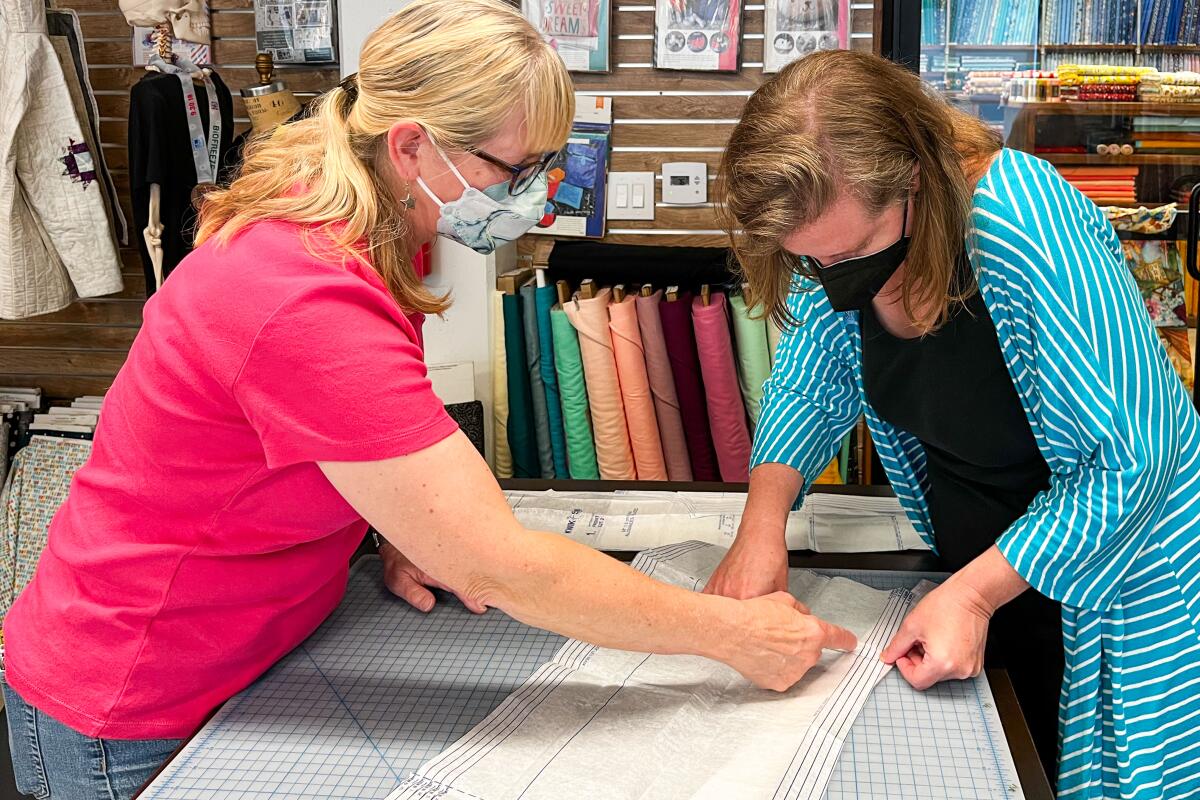
Sewing Arts
The nondescript white building, formerly a post office, has tall walls brimming with more than 30,000 yards of multicolored fabrics along with sewing notions and embroidery supplies and kits. Garment sewing and quilting classes are held in a small classroom in the back corner of the store outfitted with adjustable-height worktables covered in cutting mats.
Owned by mother-daughter duo Julie and Rachel Marquez, who acquired the business from its previous owner in 2017, Sewing Arts is an authorized Bernina dealer and service center that repairs most sewing machine brands but exclusively sells Berninas.
“Our goal is to build a community, a makers space versus just a retail space or school,” said Julie. “Our shop is the ‘home store’ for the L.A. Modern Quilt Guild, the original guild the Modern Quilt Guild came from.”
The Marquezes are the third owners since 1955 of the business, originally known as Bay Cities Sewing. That store stood on what is now the Third Street Promenade in Santa Monica before moving to Pico Boulevard and finally to West L.A. last summer.
Julie, who learned to sew from her mother when she was 5, originally began as a garment sewist before beginning to quilt in earnest in the late 1990s. Rachel, who holds dual degrees from USC’s business and film schools, serves as the webmaster in charge of the online side of the business.
Among Sewing Arts’ workshop offerings are bag making, a kids camp and adult classes in garment making and sewing. Garment sewing classes, offered in three levels, are offered in four-session packages for $299 including $100 in materials costs.
I took a garment sewing level one class, in which manager and master quilter Susanne Cole led a class of seven through the construction of a pair of drawstring, elastic-waist pajama pants. We were invited to select a fabric from the store’s troves of printed options before Cole cut us each 3 yards. No sewing took place in the first class as Cole helped students take measurements, cut out pattern pieces and wind bobbins using the studio’s state-of-the-art Bernina machines.
While true beginners may feel supported by the slow pace, after having to endure a cross-town commute, I chafed against it. But it came in handy when I had to miss a week’s class and was able to catch up in the next one (dedicated make-up classes are not offered).
Sewing Arts is geared more toward aspiring quilters than sewists, with multiple quilt offerings including three levels of piecing and quilting courses, a foundational paper piecing workshop, a lecture on quilting as a graphic designer and other quilt presentation and trunk shows. The shop offers specialty long-arm services for large pieces of fabric. It also hosts sew-ins and workshops for local quilt guilds, with teachers flying in from across the country (and, in one case, Australia) to teach workshops.
Parking: Dedicated lot parking
Price: From $79 for a three-hour youth sewing workshop to $299 for a garment sewing level one four-week course
What to bring: Materials are covered in the class fee and Bernina machines are provided to work on. Bring a face mask, as Sewing Arts still abides by a strict mask policy.
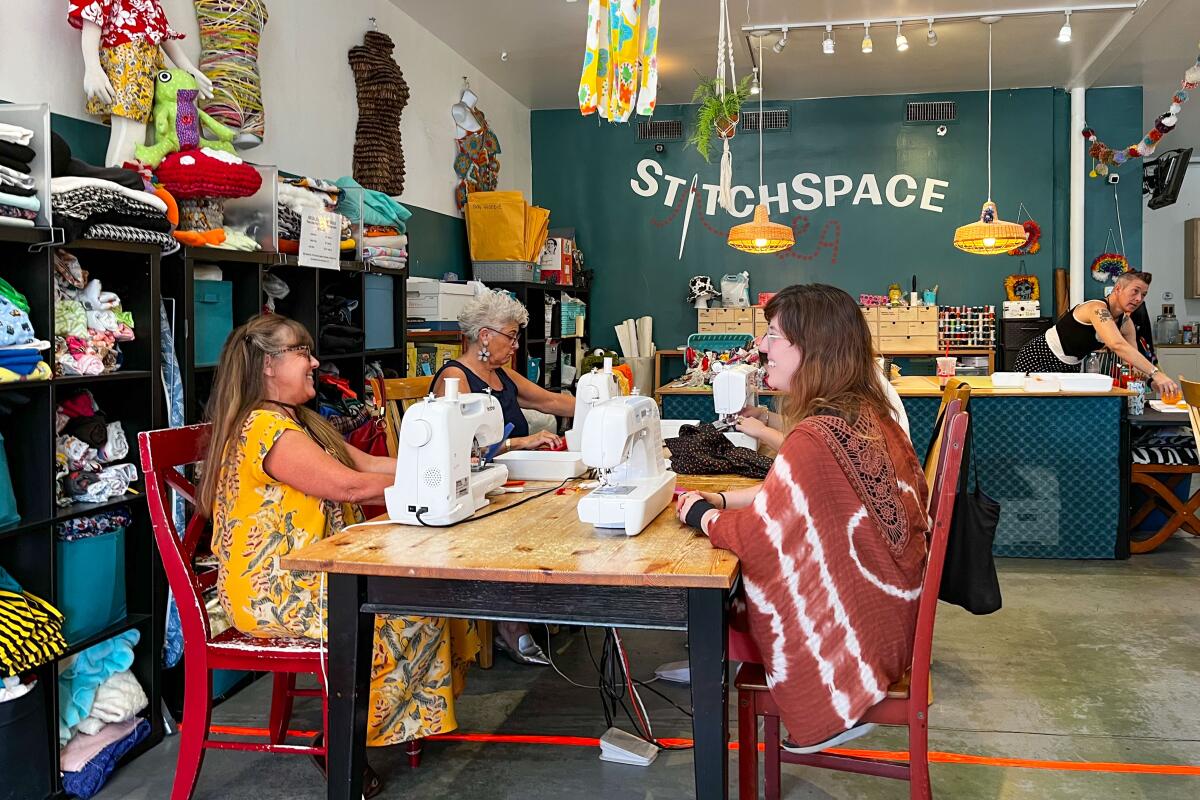
StitchSpace L.A.
Co-owned by instructors Samatha Bloom and Amy Russell, the Sherman Oaks sewing and fiber arts studio has been in operation for four years. Among its offerings are classes in machine and hand sewing, crochet, knitting and quilting. (Bloom specializes in crochet and fiber arts while Russell leads as the sewist.)
The studio’s aesthetic reflects the varied crafts offered here, with framed woven and needlepoint projects adorning the walls alongside mannequins displaying handmade garments. Biweekly Sip ‘N Stitch events feature projects ranging from needle felted pet portraits to macrame and flower crowns.
The studio also hosts bimonthly marketplace events showcasing local artists and makers. “We really try to create a community and give people of all ages many different opportunities to create and support others who are as well,” said Bloom.
For aspiring sewists who prefer a structured path to learning, look no further than StitchSpace, which offers a series of incrementally difficult projects to get beginners started. I attended the first class in the beginners series, where Russell guided me and another student through the creation of a patchwork pillow using the studio’s fabric scraps. (The following classes in the series include the construction of a reversible tote bag, pajama pants and a dopp kit or small zippered bag.)
Russell, whose friendly and supportive demeanor (not to mention the small scissors she wears on a chain around her neck) call to mind Ms. Frizzle from “The Magic School Bus,” began the lesson with an explanation of how the machine works and an overview of the different parts of the machine. Motown hits played faintly from the speakers overhead as students working under other instructors busied themselves around the dedicated pattern-cutting table, fabric-filled cubbies, nine sewing machines and two sergers.
With classes capped at eight people, students can always expect individual attention.
Parking: Street parking
Price: $40 for a two-hour hand sewing or crochet class, $45 for a two-hour knitting class, $50 for a two-hour machine sewing or quilting class
What to bring: Materials for beginner machine sewing projects are provided by the studio, but further projects require students to bring their own fabric, thread and other notions.
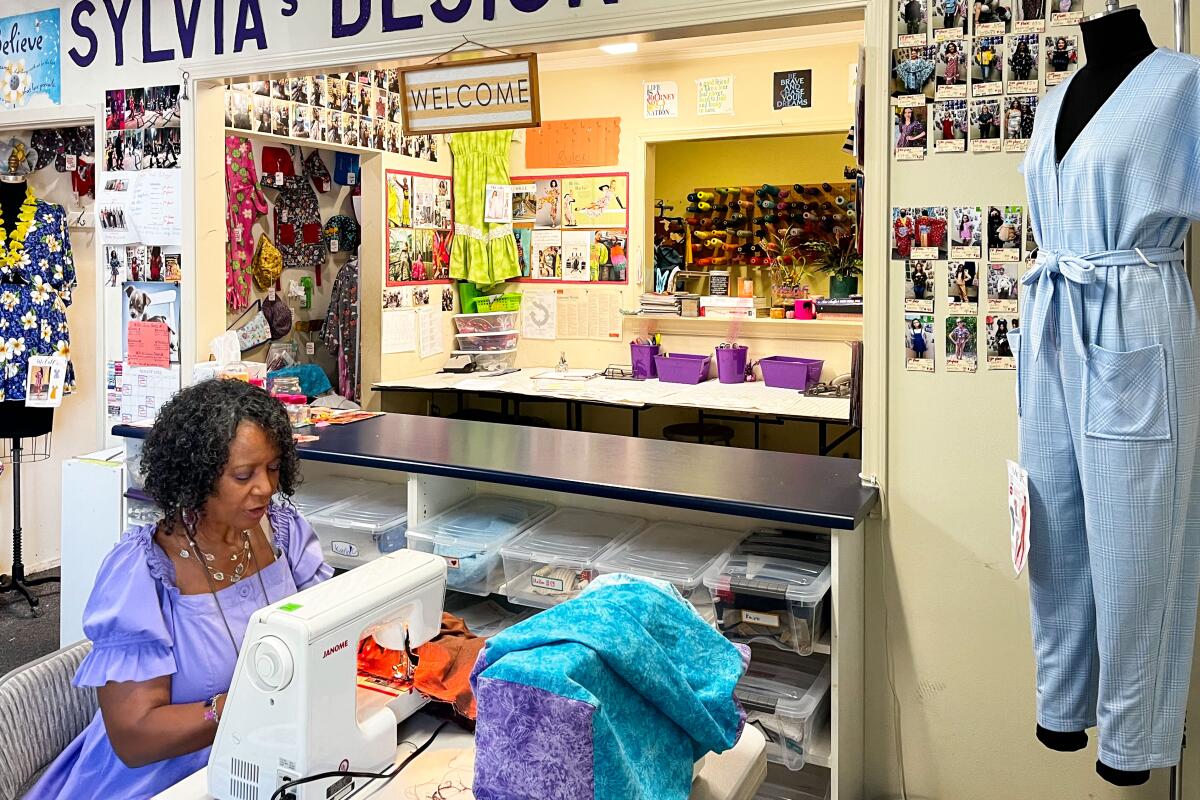
Sylvia's Design Studio
Located in a small commercial space on Manchester Boulevard, the studio is adorned with photos of Tedford’s young students brandishing their creations, fashion magazine cutouts and shelves and cubbies brimming with all manner of sewing notions and projects.
Tedford, who primarily teaches homeschool students, started offering sewing lessons after learning that home economics had been discontinued in public schools. “I just think about if I didn’t have some place to keep my creative juices going, I don’t know where I’d be at this point,” she said. “That prompted me to open a place where aspiring creatives could come and learn a [valuable] life skill.”
For adults, she offers two-hour group lessons four days a week, private lessons including workshops to re-create favorite garments, machine explainers, Sip N Sew events and pattern-making classes. I took a private lesson with her with the intention of finishing a dress I had started in another class. A friendly and loquacious teacher, Tedford walked me through finishing the edges with bias tape and serging the seams with her vintage machine. I was so charmed by her late-’60s Babylock serger that I scoured eBay to buy the same model.
Her offerings for kids ages 7 to 17 are more expansive: In addition to machine explainers, knitting and crochet classes, fashion design board-making, birthday parties and pattern-making classes, she offers an incremental class series featuring projects like emoji pillows, a pencil case, backpacks, fanny packs and a two-piece pajama set. Her kids intro to sewing class costs just $20 for two hours, and drop-in and open sew sessions are available for those who’ve completed all the beginner projects. She also hosts a Mommy & Me T-shirt making class for moms and daughters looking to bond through sewing.
Parking: Street parking
Price: For adults: $40 for a two-hour group lesson, $86 for a private sewing lesson, $120 for a private home lesson, $400 for four pattern-making lessons. For kids: $20 for an intro class, $140 for four two-hour classes, $320 for four two-hour pattern-making classes.
What to bring: Tedford provides machines but beyond the kids beginner sewing series, bring your own pattern and fabric.
Sign up for The Wild
We’ll help you find the best places to hike, bike and run, as well as the perfect silent spots for meditation and yoga.
You may occasionally receive promotional content from the Los Angeles Times.
